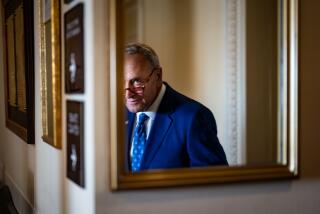Clinton Stance Bolsters Odds for Tobacco Bill
- Share via
Whether Congress will be able to pass sweeping tobacco legislation next year depends on at least three big ifs:
Can President Clinton and Republican lawmakers unite behind the goals he announced Wednesday? Will the cigarette companies give ground on key points? Can a bill be fashioned that is simultaneously palatable to the tobacco industry and tough enough to pass muster with public health organizations?
All these outcomes appeared possible after Clinton’s call for major revisions of the proposed $368.5-billion tobacco settlement, but plenty of uncertainties and hurdles remain--including the impact of major lawsuits against the industry in Texas, Pennsylvania and Minnesota that are scheduled to go to trial before Congress will consider legislation next spring or summer.
The outcome of those cases, as well as the industry’s appeal of a landmark federal court ruling that it can be regulated by the Food and Drug Administration, could strengthen or weaken the hand of the industry and its adversaries.
Now that the president has staked out his position, the focus shifts to Congress. Unsurprisingly, not a single lawmaker publicly disagrees with the goal of dramatically reducing smoking by teenagers.
*
More significantly though, some Senate Republican leaders, including Richard Lugar of Indiana and John McCain of Arizona, already have indicated that they are amenable to one of Clinton’s key goals--a $1.50-a-pack hike in the price of cigarettes--a measure most experts consider fundamental to reducing smoking by minors.
But several other key GOP lawmakers, including Senate Majority leader Trent Lott of Mississippi and House Speaker Newt Gingrich of Georgia, immediately attacked the president Wednesday for not offering a detailed plan of action.
Four of the nation’s five major tobacco companies, in a joint statement, offered the president a partial peace offering, saying they would “work constructively with the Congress and the president” to build on the settlement announced on June 20.
Nonetheless, the companies said they disagreed with the president on some points, in particular his suggestion that the industry be subject to “tough penalties . . . uncapped, escalating . . . and non tax-deductible,” if youth smoking rates do not drop dramatically within five years.
Martin Feldman, a tobacco analyst with the investment firm Smith Barney, said he thinks the industry will bend on several points. However, he stressed that “the notion of uncapped penalties will likely not sit well with the tobacco companies’ chief executives, especially Martin Broughton from [London-based] BAT, and would therefore be very difficult to include in final legislation.”
But without such tough provisions, no legislation will satisfy key tobacco critics in Congress and in the public health community, such as David A. Kessler, former commissioner of the FDA, and C. Everett Koop, the former Surgeon General. At the behest of several lawmakers, led by Rep. Henry Waxman (D-Calif.), the two industry critics formed a special advisory panel that criticized the settlement as being too soft on the industry and said its terms provided no meaningful incentives for the industry to stop marketing to kids.
On Wednesday, though, Kessler and Koop expressed optimism that the president’s proposals--penalties and price increases to reduce teen smoking, unfettered FDA jurisdiction over the cigarette industry, requiring the industry to make broad disclosure of internal documents and protection for tobacco farmers and their communities--provided the impetus needed for action in 1998.
It was noteworthy that Kessler, Koop and several other key critics of the proposed tobacco settlement--including Waxman and Minnesota Atty. Gen. Hubert H. Humphrey III--were invited to Clinton’s White House announcement and praised the president for his leadership on the smoking issue. Even John Garrison, president of the American Lung Assn., a harsh critic of the settlement who wasn’t invited to the White House, praised Clinton.
Indeed, virtually all of the nation’s major public health organizations said they would support Clinton’s approach and step up their efforts to educate the public and pressure Congress to act. “I’m very optimistic and do believe we’re postured to get in 1998 the first responsible policy on tobacco control in this century,” said John Sefrin, chief executive of the American Cancer Society.
Nonetheless, some public health advocates said getting good, air-tight legislation would not be easy. “I don’t think it’s possible to write an agreement that the industry could not circumvent” in some way, said Matt Myers, executive director of the National Center for Tobacco Free Kids. “Any agreement has to combine two things--the toughest and fairest rules . . . and a process for imposing additional rules when the tobacco industry comes up with things we haven’t been able to think of.”
Meanwhile, it is far from clear that legislation will proceed as fast as advocates would like. Senate Majority Whip Don Nickles (R-Okla.) said he did not feel “compelled” to enact legislation even within the next year.
On the other hand, Rep. Thomas Bliley (R-Va.), chairman of the House Commerce Committee who is considered the tobacco industry’s leading advocate in Congress, said that although there would not be enough time for Congress to consider legislation this year, he would hold hearings after the lawmakers formally recess this fall.
A key tobacco industry executive said he was cheered by Bliley’s statement. “That is the first sign of movement on the House side,” said the tobacco official, who spoke on condition of anonymity.
The same source indicated that the cigarette companies are likely to concede that the FDA has unfettered authority to regulate the industry, just as it does with pharmaceutical manufacturers. But he and other industry officials continued to indicate they would resist increasing the total settlement pot.
*
Still, tobacco analyst Gary Black of Sanford Bernstein & Co. in New York said he thought the “odds of the industry walking [out of a deal] are remote.” He said the industry clearly could pay more than $368.5 billion. Clinton did not state a bottom-line figure on how big any settlement should be, leaving himself and the other parties wiggle room.
Another sign that there would be action next year came from Sen. Frank Lautenberg (D-N.J.). Lautenberg, a longtime industry critic, said he would introduce a comprehensive bill, including a $1.50-a-pack tax hike. “Through this tax, we can raise enough money to significantly reduce teen smoking, to fund appropriate public health programs, to reimburse states and the federal government for health costs and to ensure that tobacco farmers are not hit with financial hardship,” the senator said.
Still, several analysts said Clinton has to take an even more vigorous stance if anything is to happen. “It’s clear that what he’s trying to do is be the great peacemaker,” said Christopher Foreman of the Brookings Institution. “The administration wants to maximize the amount of credit they can get without taking much political risk. . . . That’s understandable from a political strategic point of view, but if you want a settlement cast a certain way you have to fight for it,” Foreman said.
* CLINTON SEEKS CHANGES
The president called for stiffer industry payments and legislation to combat teen smoking. A1
* TAX CREDIT REJECTED
The House echoed the Senate and rescinded a $50-billion tax break for cigarette makers. D3
More to Read
Sign up for Essential California
The most important California stories and recommendations in your inbox every morning.
You may occasionally receive promotional content from the Los Angeles Times.










